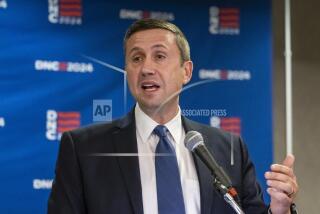New Democratic Party Chief Named : Politics: David Wilhelm, Clinton’s campaign manager, is chosen to replace Brown. Selection signals unusually close ties with White House.
- Share via
WASHINGTON — The Democratic National Committee Thursday ratified President Clinton’s choice of David C. Wilhelm, his campaign manager, as the party’s new chairman.
In a unanimous vote, the committee selected Wilhelm, a Chicago-based political consultant, to replace Ronald H. Brown, who won Senate approval Thursday as Clinton’s secretary of commerce. At 36, Wilhelm is the youngest Democratic Party chairman in recent memory, officials said.
Wilhelm’s selection signals an unusually intimate relationship between the White House and the national party committee. Wilhelm said that he will attend daily staff meetings at the White House, an unusual role for a party chairman.
Since his selection by Clinton, Wilhelm has indicated that he wants the party to play an uncharacteristically large role in the development of popular support for Clinton’s legislative agenda.
Wilhelm has said that he intends to work closely with the White House to convert the Clinton campaign’s grass-roots political organization into an ongoing lobbying force. On Thursday, he said that he plans to “take a page out of the 1981 Ronald Reagan playbook” and pressure Congress to back Clinton’s economic agenda by organizing supporters in congressional districts around the country.
Several other strategists from the Clinton campaign--including pollster Stanley B. Greenberg and senior advisers James Carville and Paul Begala--are expected to join Wilhelm at the committee as consultants. Sources said that Clinton plans to meet with the outside consultants regularly, perhaps as often as weekly, as he attempts to create a national coalition by building on the foundation of the 43% vote he received last November.
Such sessions, and the inclusion of Wilhelm in White House staff meetings, represents an effort by Clinton to draw on the political advisers who shaped his message and guided his drive to the presidency.
Speaking to the Democratic National Committee Thursday, Greenberg underscored the fragility of Clinton’s coalition. “This election was not in any way a realigning election,” Greenberg told the assembled Democrats.
Rather, he said, Clinton now faces a situation analogous to Richard M. Nixon’s position after his narrow three-way victory in 1968. Just as Nixon expanded his coalition by attracting former supporters of George C. Wallace, Clinton must now cement into his political base admirers of Ross Perot, Greenberg said.
“We have . . . to bring those voters over,” Greenberg said. “I believe that is our primary task if we are going to turn this election from a Republican collapse into a genuine Democratic victory.”
At a moment when Clinton aides are debating how many risks to assume in the preparation of his economic plan, Greenberg suggested Thursday that the real risk may be failing to act boldly.
More to Read
Get the L.A. Times Politics newsletter
Deeply reported insights into legislation, politics and policy from Sacramento, Washington and beyond. In your inbox twice per week.
You may occasionally receive promotional content from the Los Angeles Times.










